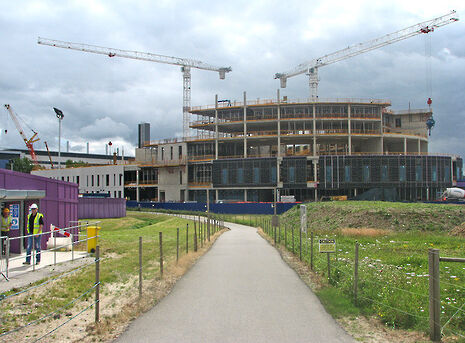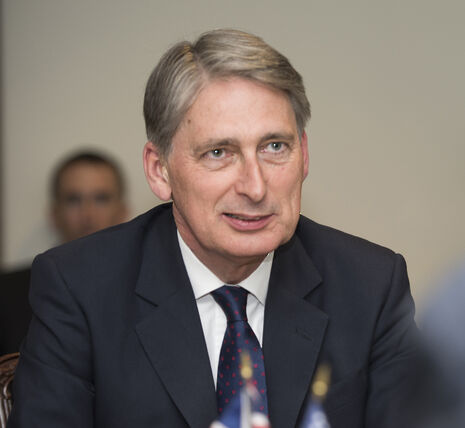Cambridge after Brexit: business as usual?
Darcy Levison discusses the uncertain future of Cambridge’s research after the vote to leave the EU

Following Philip Hammond’s assurances last week that funding for scientific research projects will be guaranteed for the foreseeable future, many labs in universities and research centres across the UK are sighing with relief. At least, this is what Hammond probably envisages. In fact, with research relying on infrastructure, professional collaboration and opportunities for further funding, the idea that government financial support for previously EU funded projects will alone guarantee the same quality of research is ill-conceived – and universities such as Cambridge may end up footing the bill.
The press release in question doesn’t shy away from acknowledging the world-class research carried out across the UK, and the fears of researchers. Hammond guaranteed that all funding will be underwritten for research awards, even when those projects continue post Brexit. He also acknowledged that researchers “want reassurance about the flow of funding they will receive”, clearly attempting to calm turbulent waters. This supports the words of Jo Johnson, minister for universities and science, who has previously stated that UK researchers should continue to “apply to the programme [Horizon 2020] in the usual way”.
The use of these words is significant - both Hammond and Johnson are blatantly aware of the protections for research promised by the Leave campaign in the run up to the referendum. In this vein, the aim appears less about the fine details of research funding and more about settling nerves with a transparent ‘business as usual’ approach.

This approach is dangerous however, as, in reality, the business of research is not so simple. Importantly, funding provided by Brussels to research is not limited to the actual projects – it also helps to support the infrastructure that underpins them. In Cambridge, this includes the new Papworth Hospital, which received £46 million pounds of funding specifically to forward specialised research.
The site of the hospital, on the Biomedical Campus, was also supported because it placed it close to Cambridge University, with a plethora of scientific and medical talent. While Hammond has promised to honour EU-backed infrastructure projects submitted and approved before the autumn budget, this offers no guarantee of further government support in future. Indeed, the danger of Westminster being in sole charge of infrastructure is that national politics come to bear on important projects, with money shifted, and pet projects prioritised. In contrast, the EU has in the past offered continuity – and this has benefited the creation of infrastructure purposefully built to forward research.
Hammond’s promises on funding also miss the key point that research does not just materialise. Cambridge researchers currently benefit from strong collaborations with numerous EU individuals and institutions. As a university, we are members of the Marie Skłodowska-Curie Actions researcher mobility programme, and many departments conduct research collaborations with EU labs through other means. As we leave the EU, maintaining these relationships will be highly important, and yet Hammond’s consciously short term reassurances have, according to reports in The Guardian, done little to calm some EU research partners. Given that Hammond has only guaranteed the underwriting of funding submitted before negotiations conclude, this may also cause a number of planned projects to be brought forward, perhaps without being as well explored as fully.
The promises of the government are also worrying as their emphasis on Horizon 2020 implicitly casts research as a scientific endeavour. This conveniently passes over the many other projects that can currently apply for EU support, including those in economics, social science and law. In Cambridge, we harbour particular expertise in EU law through the Centre of European Legal Studies, a valuable resource for academics and lawyers all over Europe. In politics and policy, the Cambridge Programme for Sustainability Leadership, with an office based in Brussels, is in a particularly intriguing position of not only being likely low priority for government funding, but also partially in the wrong country. Both of these programmes, highly successful, may now be looking elsewhere for funding to promote future initiatives.
In truth, given the insecurities discussed, the future of Cambridge University research is only guaranteed as far as it is self-sufficient. Currently, 17 per cent of research at the University is EU funded, and we receive the largest amount of funding of any institution in Europe from the European Research Council (ERC) and Horizon 2020. Luckily for those hoping for a ‘business as usual’ approach on a University level, the Vice Chancellor, an open Remain supporter, insisted in July that “we will continue to be the strongest and the best and Europe’s leading research university, even outside the EU.”
Unfortunately, this increases the likelihood of possible costs for students, the most obvious of which may be an eventual fee rise to £12,000 for undergraduates, in line with the new government directive. For humanities students, already subsidising the education of those in science, medicine and engineering, this is likely to be contentious.
That said, the University must be congratulated for assurances that EU students will continue to pay the same fees as UK students for the foreseeable future, rather than taking the opportunity to raise money this way. The same cannot be said for Hammond, whose ‘business as usual’ approach seems suspiciously likely to turn long-term into a business neglected by the government – with universities and research bodies picking up the bill.
 News / Fitz students face ‘massive invasion of privacy’ over messy rooms23 April 2024
News / Fitz students face ‘massive invasion of privacy’ over messy rooms23 April 2024 News / Climate activists smash windows of Cambridge Energy Institute22 April 2024
News / Climate activists smash windows of Cambridge Energy Institute22 April 2024 News / Copycat don caught again19 April 2024
News / Copycat don caught again19 April 2024 Comment / Gown vs town? Local investment plans must remember Cambridge is not just a university24 April 2024
Comment / Gown vs town? Local investment plans must remember Cambridge is not just a university24 April 2024 News / Emmanuel College cuts ties with ‘race-realist’ fellow19 April 2024
News / Emmanuel College cuts ties with ‘race-realist’ fellow19 April 2024




